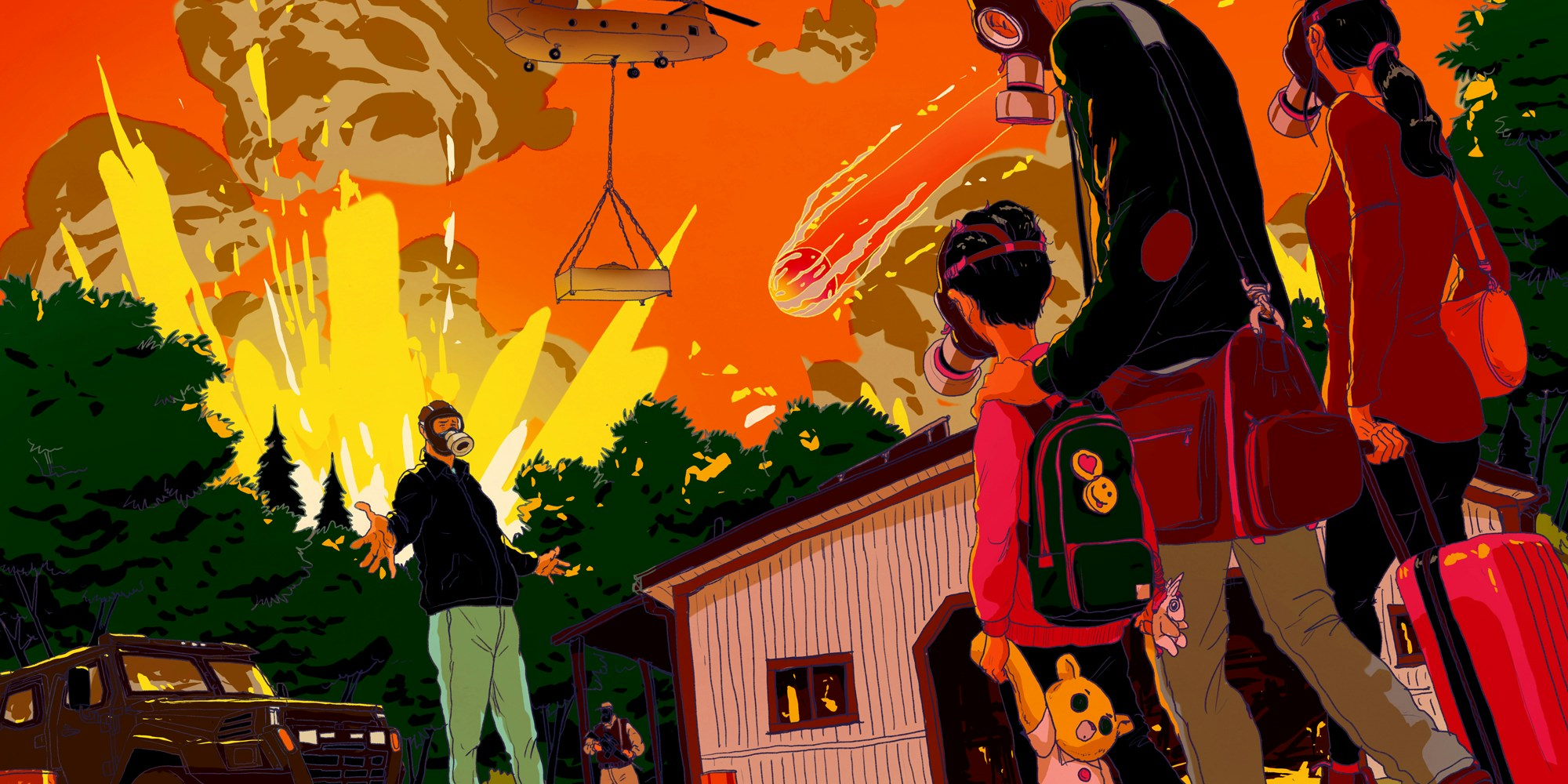The Rise and Fall of the Ultimate Doomsday Prepper

"Barrett Moore had ordered 2 million N95 masks, held enough freeze-dried food to feed families hiding from global Armageddon for decades, owned a small arsenal of guns, and fortified a pole barn in which to wait out the collapse of civilization. But he had something no one else could buy: knowledge that the end was coming and that the supply chains would snap; the best hope your family had was holing up in his northern Michigan compound while things fell apart. The price for this service would run in the hundreds of thousands of dollars, to be paid in installments. Starting in 2007, the former private military executive (who boasts of his special forces connections and a past life as a spy deployed to Australia) offered to friends and associates with enough money a chance at private salvation, claiming that he and his team could whisk them away from jihadis, electromagnetic pulses, pandemics, or any other existential threat when the great, imminent collapse of the United States came to pass. He called this service “Life Continuity.”
Of the many threats he obsessed over and warned of, Barrett Moore’s cosmology of collapse revolved around the supply chain and how quickly it would buckle under the weight of a national (or global) disaster. “Few people understand how supply chains operate, how heavily we depend on them, and how critical they are to our existence—this is especially true for urban dwellers,” Moore wrote in an essay on one of his websites. The U.S. government couldn’t be trusted to ensure the distribution of vital goods in a prolonged emergency: “Proper reserves of food, backup systems in the event of EMP [electromagnetic pulse] attack, or a healthcare system adapted to cope with pandemics, are obvious areas of negligence.” Moore would provide the safety net that the U.S. government refused to build, and he set out to create essentially a private version of the Federal Emergency Management Agency for the 1 percent.
Moore’s full plan envisioned the construction of not just one Haven but a constellation of bunkerized redoubts throughout the world, planned with his Iraq War expertise and that of military contacts he’d formed through Triple Canopy and his time in Australia. In a 2007 company overview created for potential investors, a nascent Sovereign Deed (the first of many companies trading on Life Continuity) described itself in the grandest imaginable terms, a firm that would do for personal safety what Google did for the internet, whose “operations will eventually have a global reach. … New York, London and Tokyo have already suffered terrorist attacks and natural/manmade disasters can certainly occur world-wide. We anticipate that, eventually, our clients will be as diverse and varied as the events from which we help them recover.” According to this master plan, the planet would become dotted with “local” and “national” Havens, replete with “long-term facilities featuring private accommodations, food preparation facilities, medical facilities, water and waste treatment, protective barriers against radiological, biological and chemical biohazards, communication facilities, and security controls.” Even Sovereign Deed’s internet strategy was overwhelmingly ambitious: “We have purchased over 5,000 URLs that might become associated with the private civil defense market,” the Sovereign Deed pitch noted.
Sovereign Deed was to be a privatized state within the state for the rich, with a fleet of planes, boats, armored vehicles, and trained rescue personnel, all coordinating through a “national network including satellite phones, land lines, cellular towers, fiber optic cable and radio frequency bands providing redundant systems for both verbal and textual communication.” For the boardroom barons and law firm partners Sovereign Deed envisioned as its bread-and-butter clientele, the company would offer an array of tantalizing toys: While the rest of their employees withered under clouds of radiation, an executive customer would be armed with a “Communications Pack (ComPak), a waist pack containing communications equipment, including a satellite telephone, GPS and other devices, to connect with and receive information from Sovereign Deed.”
Sovereign Deed offered a variety of consultation services, but the big sell was the comprehensive evacuation package. After paying the sizable membership fee, customers were guaranteed access to the Haven, a spot on the ark. Members received an emergency evacuation plan, printed in bright red as if it contained nuclear launch codes, detailing with GPS specificity exactly how to arrive at their premium post-apocalyptic hideaway, whether by car, boat, or jet. Clients were asked to “avoid discussing the existence of this haven with anyone other than your immediate family members,” and were told that the “identity of individuals invited to use the haven facility is tightly controlled.” Moreover, they were warned “the havens [sic] staff will not have access to that list until the facility is activated,” and “those invited to access the haven are unaware of the identity of others with access,” according to one membership document"
more in the longread by sam biddle


